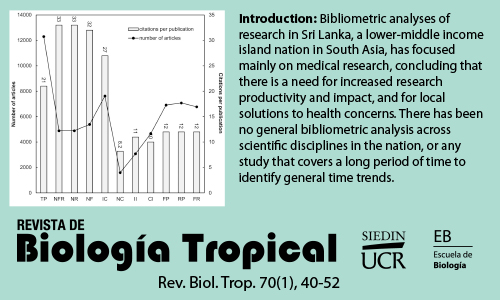Abstract
Introduction: Bibliometric analyses of research in Sri Lanka, a lower-middle income island nation in South Asia, has focused mainly on medical research, concluding that there is a need for increased research productivity and impact, and for local solutions to health concerns. There has been no general bibliometric analysis across scientific disciplines in the nation, or any study that covers a long period of time to identify general time trends. Objective: To measure and analyse Sri Lankan research by focusing on subjects, authors, institutions, journals and citation for half a century. Methods: We used an advanced search method to extract publications with the word “Sri Lanka” in the SCI-EXPANDED, and calculated indicators such as total citations from Web of Science Core Collection since publication year to the end of 2019, citations in 2019, and mean citations per publication. Journal data were taken from 2019 Journal Citation Report. Affiliation re-classification was done to ensure consistency regarding the origin of all publications. Publications were further analysed based on collaboration, and first and corresponding authorship. Results: We retrieved 16 069 publications in 19 document types (77 % articles). Corrections had the highest number of authors per publication (616) followed by articles (116). Four articles had more than 5 000 authors and 593 articles had more than 1 000 authors. The highest citations in this database were for international megaprojects where Sri Lankan authors played minor roles. The UK had the most collaborative articles with Sri Lanka (19 %). The articles were published in 3 051 journals across 177 Web of Science categories. The category of Public, environmental and occupational health, with 193 journals, had 6.7 % of all articles, followed by environmental sciences (6.6 %). Conclusion: Sri Lanka has an unusually strong pattern of participating as small role players in international megaprojects about health and physics. Sri Lankan authors should be encouraged to expand their horizons by researching non-applied fields that are the basis of all innovation; to strengthen their own journals so that they have better visibility and impact, and to improve their positions in international projects that are published in larger journals.
##plugins.facebook.comentarios##

This work is licensed under a Creative Commons Attribution 4.0 International License.
Copyright (c) 2022 Revista de Biología Tropical







